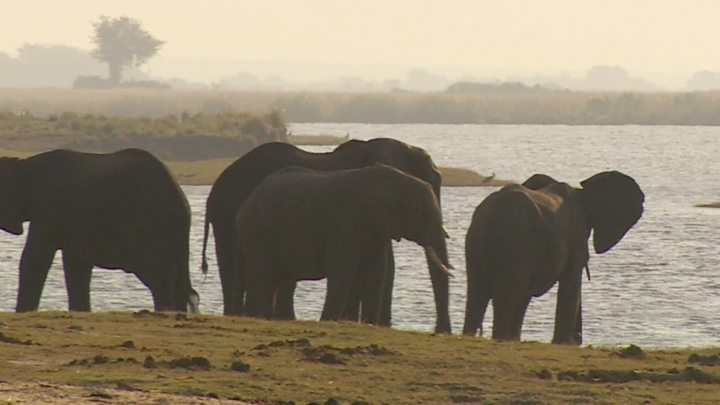Botswana has cancelled the licences of two professional hunters who shot dead a research elephant.
Michael Lee Potter and Kevin Sharp had voluntarily surrendered their hunting licences, a government statement said.
Botswana lifted a ban on elephant hunting in May, citing growing conflict between humans and the animals.
However the elephant, which was shot last month, had been collared - giving it protected status as a research elephant.
In a statement on Saturday night, the government said: "The period of the surrender of Mr Potter's license is indefinite while Mr Sharp's license will be surrendered for a period of three years with immediate effect."
It did not provide information about the nationality of the two men. Neither of the men were available for comment.
The two men have also been ordered to replace the elephant's destroyed collar, the government said.
It is not clear how the elephant's collar was damaged.
According to an earlier government statement, the hunters said they had not seen the collar because "the elephant was in a full-frontal position".
"Once the animal was down, they realised it had a collar on it placed for research purposes."
However, Neil Fitt from the Kalahari Conservation Society questioned this, telling AFP that elephant collars are "extremely large".
Meanwhile, Reuters news agency reported that the two men had destroyed the collar in an attempt to hide the evidence.
 Last June Botswana President Mokgweetsi Masisi set up a committee to review the hunting ban imposed by his predecessor Ian Khama in 2014.
In February, the committee recommended allowing hunting again.
Officials said the move was driven by increase in human and wildlife conflict.
Elephants can be very destructive when they encroach onto farmland and move though villages - destroying crops and sometimes killing people.
Most of the country's elephants live in the country's northern region, roaming across borders into Namibia, Zambia and Zimbabwe.
There are some 415,000 elephants in Africa, according to the International Union for Conservation of Nature (IUCN), with the population having been decimated largely due to poaching for ivory.
Last June Botswana President Mokgweetsi Masisi set up a committee to review the hunting ban imposed by his predecessor Ian Khama in 2014.
In February, the committee recommended allowing hunting again.
Officials said the move was driven by increase in human and wildlife conflict.
Elephants can be very destructive when they encroach onto farmland and move though villages - destroying crops and sometimes killing people.
Most of the country's elephants live in the country's northern region, roaming across borders into Namibia, Zambia and Zimbabwe.
There are some 415,000 elephants in Africa, according to the International Union for Conservation of Nature (IUCN), with the population having been decimated largely due to poaching for ivory.
 Last June Botswana President Mokgweetsi Masisi set up a committee to review the hunting ban imposed by his predecessor Ian Khama in 2014.
In February, the committee recommended allowing hunting again.
Officials said the move was driven by increase in human and wildlife conflict.
Elephants can be very destructive when they encroach onto farmland and move though villages - destroying crops and sometimes killing people.
Most of the country's elephants live in the country's northern region, roaming across borders into Namibia, Zambia and Zimbabwe.
There are some 415,000 elephants in Africa, according to the International Union for Conservation of Nature (IUCN), with the population having been decimated largely due to poaching for ivory.
Last June Botswana President Mokgweetsi Masisi set up a committee to review the hunting ban imposed by his predecessor Ian Khama in 2014.
In February, the committee recommended allowing hunting again.
Officials said the move was driven by increase in human and wildlife conflict.
Elephants can be very destructive when they encroach onto farmland and move though villages - destroying crops and sometimes killing people.
Most of the country's elephants live in the country's northern region, roaming across borders into Namibia, Zambia and Zimbabwe.
There are some 415,000 elephants in Africa, according to the International Union for Conservation of Nature (IUCN), with the population having been decimated largely due to poaching for ivory.DISCLAIMER: The Views, Comments, Opinions, Contributions and Statements made by Readers and Contributors on this platform do not necessarily represent the views or policy of Multimedia Group Limited.
Latest Stories
-
Woman dies after being set on fire on NYC subway
2 hours -
Elon Musk’s curious fixation with Britain
2 hours -
EBID wins the Africa Sustainability Award
4 hours -
Expansion Drive: Takoradi Technical University increases faculties
8 hours -
SHS heads demand payment of outstanding funds before reopening of schools
8 hours -
We thank God for the 2024 general elections – Akufo-Addo
9 hours -
Coconut Grove Beach Resort marks 30 years of excellence with memorable 9 lessons & carols service
9 hours -
WAFU B U-17 Girls’ Cup: Black Maidens beat Nigeria on penalties to win inaugral tournament
10 hours -
Real Madrid beat Sevilla to keep pressure on leaders Atletico
11 hours -
Liverpool put six past Spurs to go four points clear
11 hours -
Manchester United lose 3-0 at home to Bournemouth yet again
11 hours -
CHAN 2024Q: ‘It’s still an open game’ – Didi on Ghana’s draw with Nigeria
11 hours -
CHAN 2024Q: Ghana’s Black Galaxies held by Nigeria in first-leg tie
12 hours -
Dr Nduom hopeful defunct GN bank will be restored under Mahama administration
12 hours -
Bridget Bonnie celebrates NDC Victory, champions hope for women and youth
13 hours

